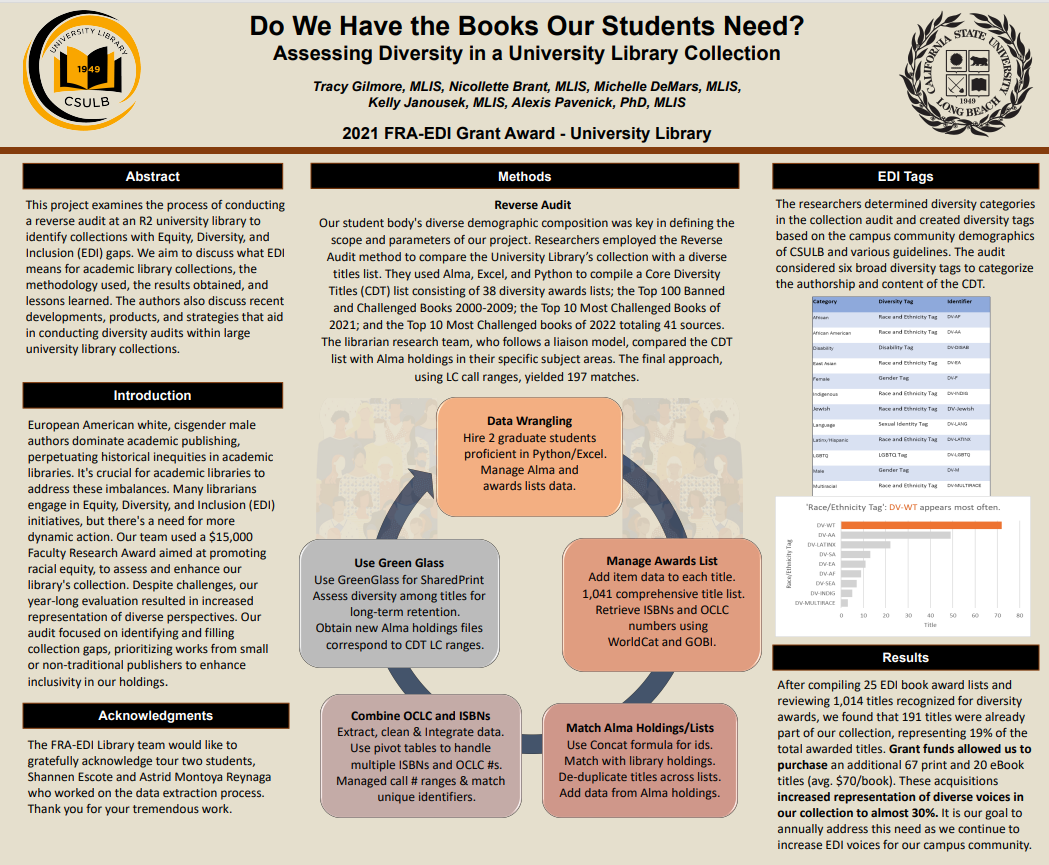President & Provost Initiative: Faculty Research Awards in Inclusive Excellence

Background & Scope of Funding:
The University seeks proposals for Faculty Research Awards to promote Inclusive Excellence (FRA-IE). Through this program, we encourage and accept proposals for projects that will investigate issues of inclusive excellence that support student access and success on the CSU Long Beach campus and/or in our immediate geographical region. Proposed projects should span AYs 2025-26 and 2026-27, with research and development in year one and an implementation phase in year two.
Inclusive excellence is a professional practice by which faculty members of all backgrounds draw upon a range of strategies, skills, and insights—acquired through training as well as personal experience—to enhance learning, innovation, and institutional effectiveness.
Inclusion is an active, intentional, and ongoing engagement with diversity across the curriculum, co-curriculum and our communities to increase awareness, content knowledge, cognitive sophistication, and empathic understanding of the complex ways individuals interact within systems and institutions.
McNair, T. B., Bensimon, E. M., & Malcom-Piqueux, L. (2020). From equity talk to equity walk: Expanding practitioner knowledge for racial justice in higher education. John Wiley & Sons.
Inclusive Excellence consists of four primary elements: 1. A focus on student intellectual and social development. 2. A purposeful development and utilization of organizational resources to enhance student learning. 3. Attention to the cultural differences learners bring to the educational experience and that enhance the enterprise. 4. A welcoming community that engages all of its diversity in the service of student and organizational learning.
Bauman, G. L., Bustillos, L. T., Bensimon, E. M., Brown, M. C., & Bartee, R. (2005). Achieving equitable educational outcomes with all students: The institution’s roles and responsibilities. Washington, DC: Association of American Colleges and Universities.
The goals of the FRA-IE program are:
- shed light on how the campus approaches faculty, staff and student recruitment, retention and success
- the valuation of teaching, scholarship, and service
- create knowledge that The Beach can contribute to broader national conversations around inclusive excellence in higher education
The program features reliance upon our significant Beach intellectual capital to interrogate campus processes, programming, practices, policies, and norms through the lens of inclusive excellence. The FRA-IE program facilitates exploration of ways for the Beach academic community can engage in strategic partnerships within the greater Long Beach community for public good against the background of our diverse campus and local populations. Results of the research should ultimately help stimulate evidence-based directions toward achieving our campus inclusive excellence goals.
Proposals with merit will be considered from across four themes:
- IE Campus Programming - describe development and evaluation of programming with high scalable potential to advance campus goals toward inclusive excellence and equitable upward mobility within the Beach community
- IE Campus Information - use institutional data or collect new data to unpack issues of inequities around student enrollment; persistence; engagement; course and degree completion patterns; Beach faculty, student and employee experiences, or gaps in institutional inclusiveness
- IE Scholarship Across Disciplines – engage in unique scholarship that examines inclusive excellence processes, norms, and practices across disciplines
- IE Partnerships – describe exploration, development, and evaluation of high promise partnership concepts with LBC and surrounding community entities toward promoting shared investment in various educational and entrepreneurial opportunities that can benefit a wide diversity of populations
Ten (10) awards of maximum $15,000 will be funded will be funded in this current competition. Participants in this grant program must be a CSULB tenured or tenure-track faculty member. Allowable expenses include faculty assigned time up to 6 WTUs; materials and supplies; data services; publication costs; allowable travel. The award period is two academic years.
Each academic college will develop and administer the proposal review process for FRA-IE. One FRA-IE award will be granted to Business, Education, Engineering, Natural Sciences and Mathematics, the Arts, and the University Library. Two FRA-IE awards will be provided to Liberal Arts and Health and Human Services in consideration for their larger FTEF.
It is strongly recommended that each college review committee consists of a diverse group of faculty with representation of across professorial ranks, as well as across races and ethnicities, and genders. They must be committed to advancing the campus inclusive excellence goals.
Timeline:
Date | Details |
17 March 2025 | RFP released to faculty |
14 April 2025 | Faculty submission deadline; check with your college office for their submission process |
5 May 2025 | College review completed; colleges submit one (1) selected proposal to ORED-Grants@CSULB.edu Attn: FRA-IE |
12 May 2025 | President and Provost announce the awards; period of award 1 July 2025 – 30 June 2027 |
Proposals will be limited to five (5) narrative pages with the following proposal components:
- Proposals will be limited to five (5) narrative pages with the following proposal components:
- Project Title
- FRA-IE Theme # (1 – 4 as listed above)
- Introduction/Background
- Significance - Please describe the problem that your project will address. If possible, include support information such as data, evidence-based practices that demonstrate the need for the project.
- Project Goal/s and Outcome/s - Please present measurable goal/s for the proposed project.
- Methodology - Please provide a brief overview of the project plan, including proposed approach and/or activities and implementation plan.
- Addressing Inclusive Excellence Issues - Please provide a brief narrative about the anticipated impact that the project’s outcome/s, and how they will advance the FRA-IE theme selected for the proposal.
- Sustainability After Project Period – Please comment on:
- Potential for External Funding - 1) Briefly describe the potential for project outputs to serve as preliminary data or other foundation for external funding initiatives or 2) not applicable.
- Potential Institutional Scalability - 1) Briefly describe the potential for scaled campus implementation, including resources, personnel, infrastructure etc. to support success or 2) not applicable.
First Year Report Submission
A first-year status report is due on 26 October 2026 to ORED-Grants@csulb.edu Attn: FRA-IE. There is no required format or template.
Final Report Submission
A final report is due on 25 October 2027 to ORED-Grants@csulb.edu Attn: FRA-IE. There is no required format or template.
2022 - 2023 FRA - EDI Award Recipients
Faculty Member: Lindsay Pérez Huber, Professor, Advanced Studies in Education and Counseling; Oscar Navarro, Assistant Professor, Liberal Studies & Teacher Education
Project Title: Examining Racial Microaggressions and Racial Microaffirmations Among Faculty, Staff, and Students of Color Amid Institutional Moves Toward Inclusive Excellence
Project Theme #3 – EDI Scholarship Across Disciplines
Abstract: This study addresses the theme of “EDI Campus Information” by collecting new qualitative data on the experiences of faculty, staff, and students of color with everyday racism at CSULB with a particular focus on the College of Education. The study seeks to uncover the illusive and often undetected way that racism, specifically, racial microaggressions occur throughout CSULB and at the College of Education. It also examines the ways faculty, staff, and students of color encounter moments of everyday forms of racial affirmations; those moments where their identities and respective work are validated and recognized. Relatedly, this study will also address the theme of “EDI Scholarship Across Disciplines,” as it will explicitly examine specific “processes, norms, practices” that may be contributing toward experiences of everyday racism, as well as those that may be providing opportunities for moments of racial affirmations to occur. While much work has been done at CSULB to address equity, diversity and inclusion, there is a need to identify and root out the way systemic racism is planted within the university. This study is an effort to locate the nuanced way that racism, sexism, and other intersecting oppressions occur and impact faculty, staff, and students of color. A secondary goal is to detect the way that antiracism, specifically, racial microaffirmations transpire at the College of Education and within CSULB. Throughout the study, the researchers seek to highlight the way that faculty, staff, and students of color are experiencing racial microaffirmations to shed light on how the university can affirm and validate historically marginalized populations. The study provides implications for the College of Education and for institutional scalability at CSULB. The research is meant to spread throughout the university to inform racial and social justice. The goal is for CSULB equity-oriented colleagues to expand this work in their respective roles, colleges, and beyond.
Faculty Member: Ming Chen, Professor, Management; Jasmine Yur-Austin, Professor, Finance
Project Title: Examine Student Course Load, Completion, and Performance Data to Identify Roadblocks and Hurdles and Close Equity Gaps in College of Business
Project Theme #2 – EDI Campus Information
Abstract: In this study, we plan to examine student demographic information and academic records for College of Business to identify areas where there exhibits the greatest equity gap. This will allow the college to allocate critical resources in the most cost-effective way to increase our chance of success in closing these gaps. More specifically, we plan to pinpoint the set of courses with the largest equity gap and hence offer programs such as summer boot camp to increase students’ level of preparedness for these courses. We plan to develop a prediction model which will allow the college to proactively reach out and advise students who are potentially at-risk to take advantage of campus-wide or college-specific support, and resources to increase their chances of success. Finally, we intend to explore some data mining techniques to further examine the relationship between course completion and factors such as varying course load issues and course sequence.
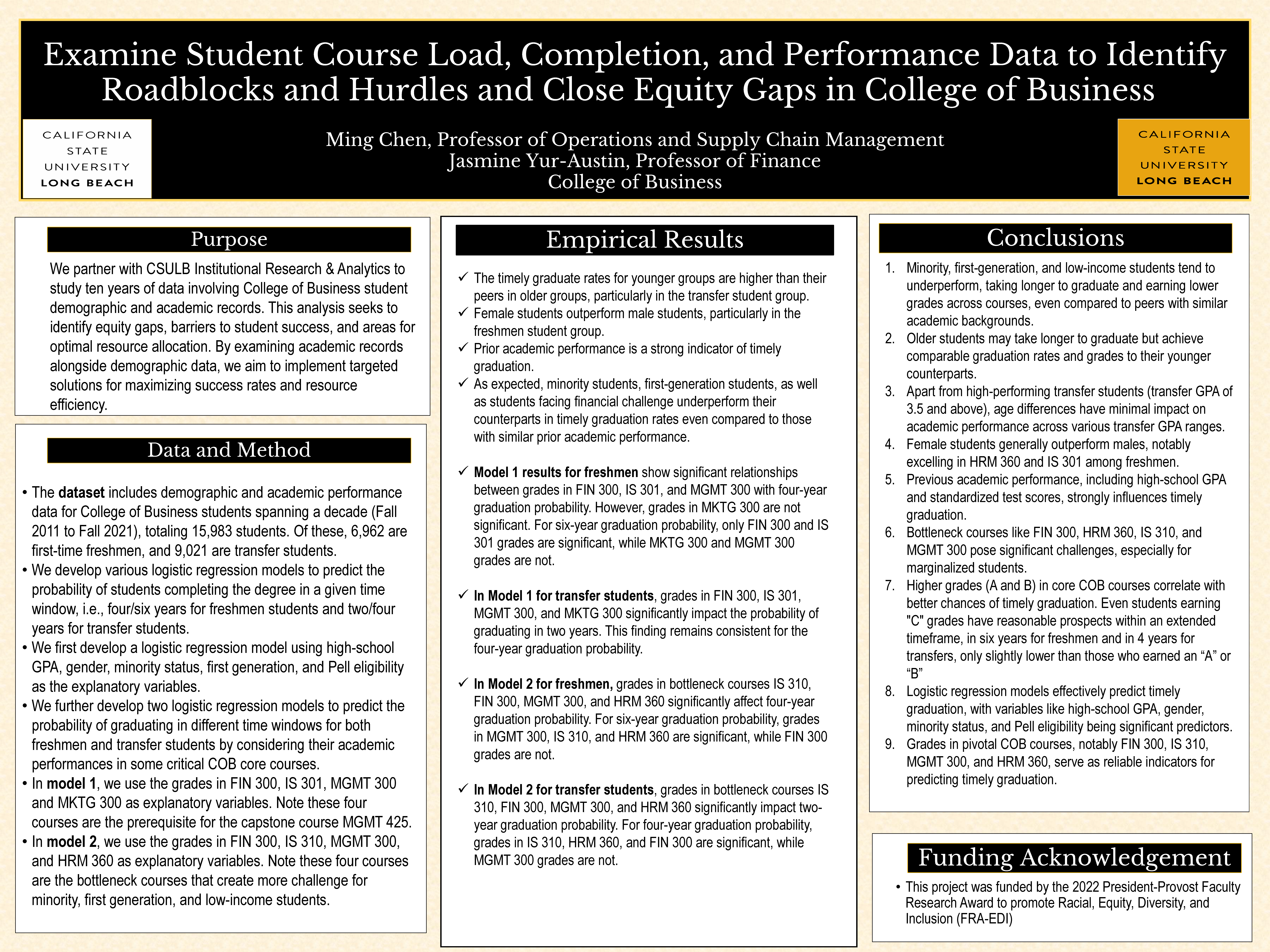
Faculty Member: Stephen Mezyk, Professor, Chemistry and Biochemistry
Project Title: Re-inventing STEM Scholarship Through EDI Campus Information
Project Theme #2 – EDI Campus Information
Abstract: The primary goal of this project is to identify, quantify and then address the specific difficulties of students who are underrepresented enrolled in California State University, Long Beach Chemistry (CSULB) courses. The focus is particularly on General Chemistry, which is a combined two-semester, 10-unit, gateway course that covers pre-requisite materials necessary for almost all upper division courses in Chemistry and Biology. While student matriculation rates have remained relatively high for the first semester CHEM111A component course, student success in the 5-unit CHEM111B course is significantly lower, particularly for students who are underrepresented. Moreover, while students achieving a “C” grade in CHEM111B allows them progression to higher-level STEM classes, at this level of mastery their fundamental knowledge is severely compromised, which continues to impact their overall GPA throughout their CSULB education experience.
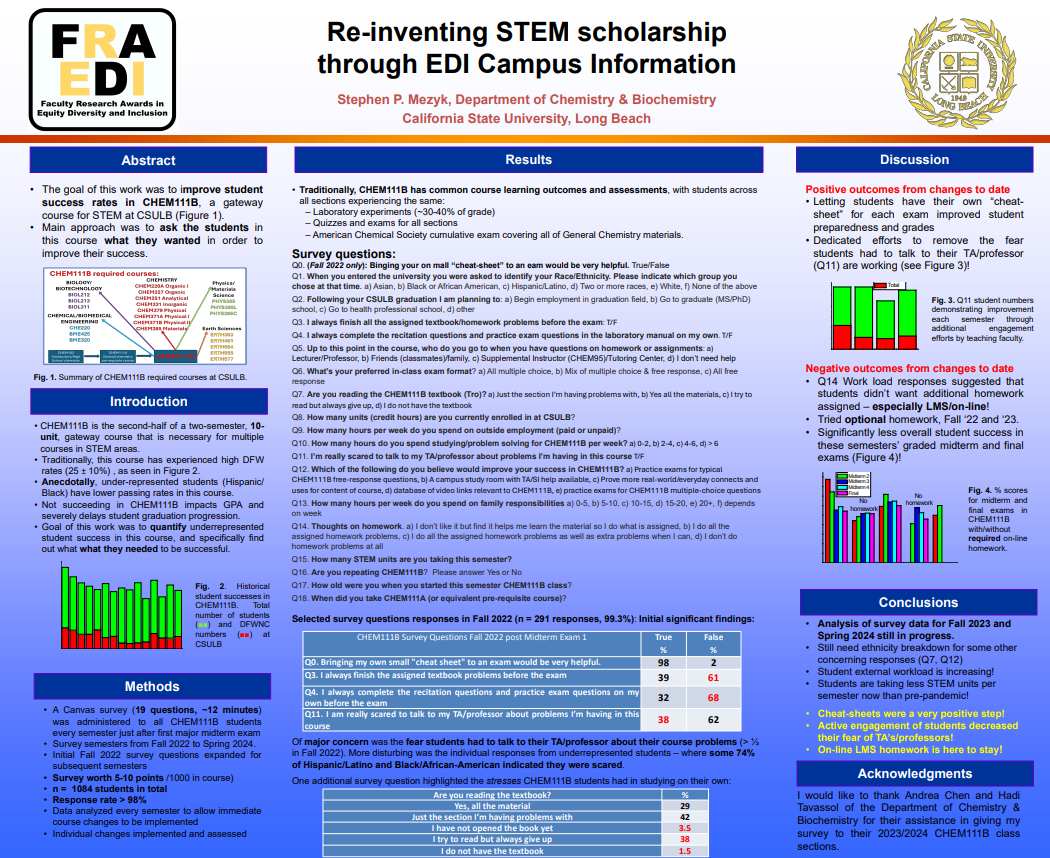
Faculty Member: Sharri Hefner, Assistant Professor; Katherine Guerra, Assistant Professor; Ben Huff, Assistant Professor; and Tasha Hunter, Lecturer, Film & Electronic Arts
Project Title: IAAM: Creating Equity, Anti-Racism & Social Justice Through Training & Positive Action
Project Theme #1 - EDI Campus Programming
Abstract: The Film and Electronic Arts IAAM (Inclusivity Across All Media) Committee — will ‘train the trainers’, as an evergreen approach to maintaining diversity, equity, and inclusion (DEI) within our campus communities. Committed to working toward lasting systemic change, our efforts to educate the next generation of entertainment industry artists and leaders will prepare students to work in and create diverse environments. We want students to be equipped with tools to address implicit bias, micro-aggressions, racism, and misogyny. In addition, we want our ability to respond to be evergreen, built into the fiber of our committee. We believe that we must support, challenge, and push boundaries. Therefore, our committee’s training in an eCornell Diversity, Equity and Inclusion certificate course; as well as opportunities for course release will ensure our department is continually able to provide DEI training to students and faculty alike, both in our department and within other populations on campus.
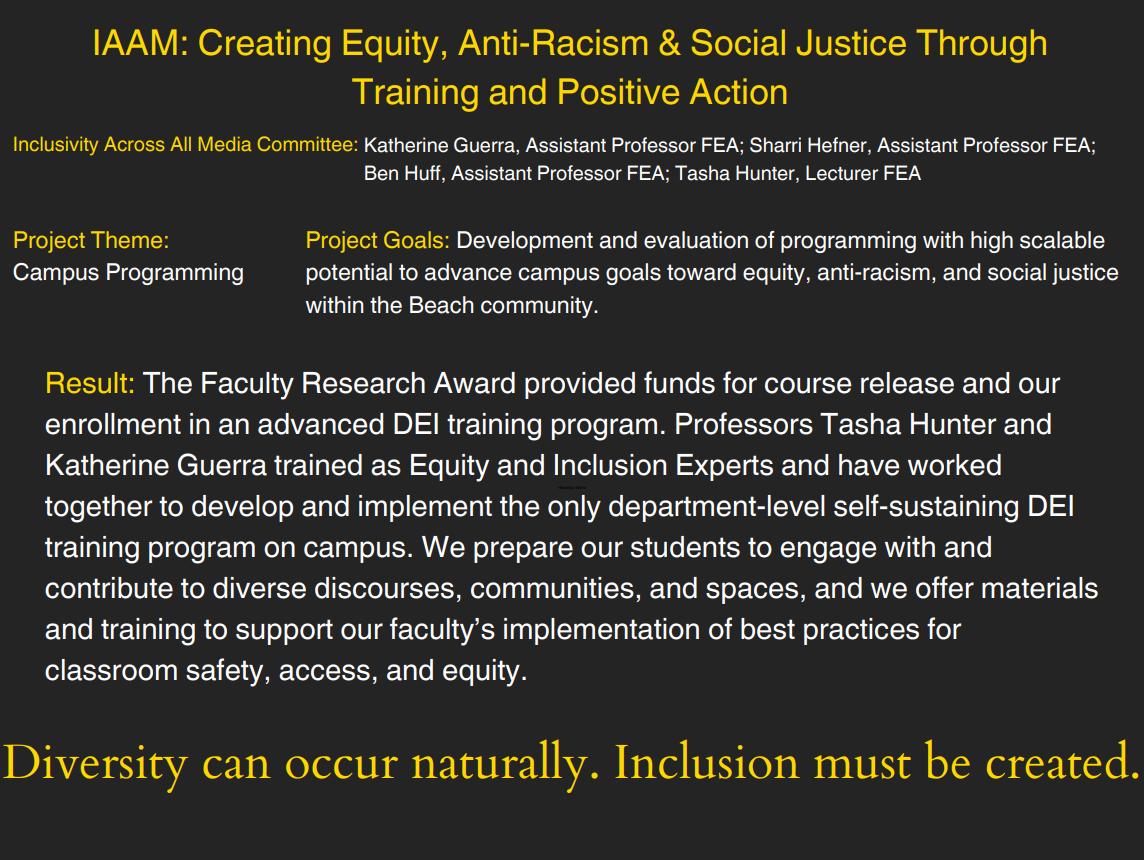
Faculty Member: Alaine Ocampo, Assistant Professor, Speech-Language Pathology
Project Title: Student Enrollment and Persistence Through an EDI Lens: Intersections of Race, Gender, and Sense of Belonging
Project Theme #2 – EDI Campus Information
Abstract: This project will focus on the intersections of race and gender with students and their sense of belonging in relation to enrollment and persistence in their respective majors.
The construct of “sense of belonging” has been well documented in the literature as being associated with academic achievement, retention, and persistence in college and these impacts are frequently more pronounced for students from marginalized groups. Fear of confirming negative stereotypes of a group one belongs to (i.e., gender, race) can undermine performance and contribute to a lack of sense of belonging as well. This can give rise to feelings that people like them do not belong there. Additionally, external cues, such as a low representation of one’s group, can influence a sense of belonging.
The term “belonging” may be less familiar than “equity” “diversity” or “inclusion,” but deserves recognition in terms of accessibility, student success, recruitment, and retention. When examining enrollment and persistence, we should continuously ask: “Does everyone on campus feel valued, connected, and able to be their authentic self?” In many ways, belonging is the emotional counterpart to inclusion (“Have everyone’s ideas been heard, respected, and understood?”). It is the feeling of having a personal involvement in an environment. This project takes an assertive approach in collecting, analyzing, and disseminating data through an equitable, diverse, and inclusive (EDI) lens with built-in “equity audits” for accountability that include “belonging.”
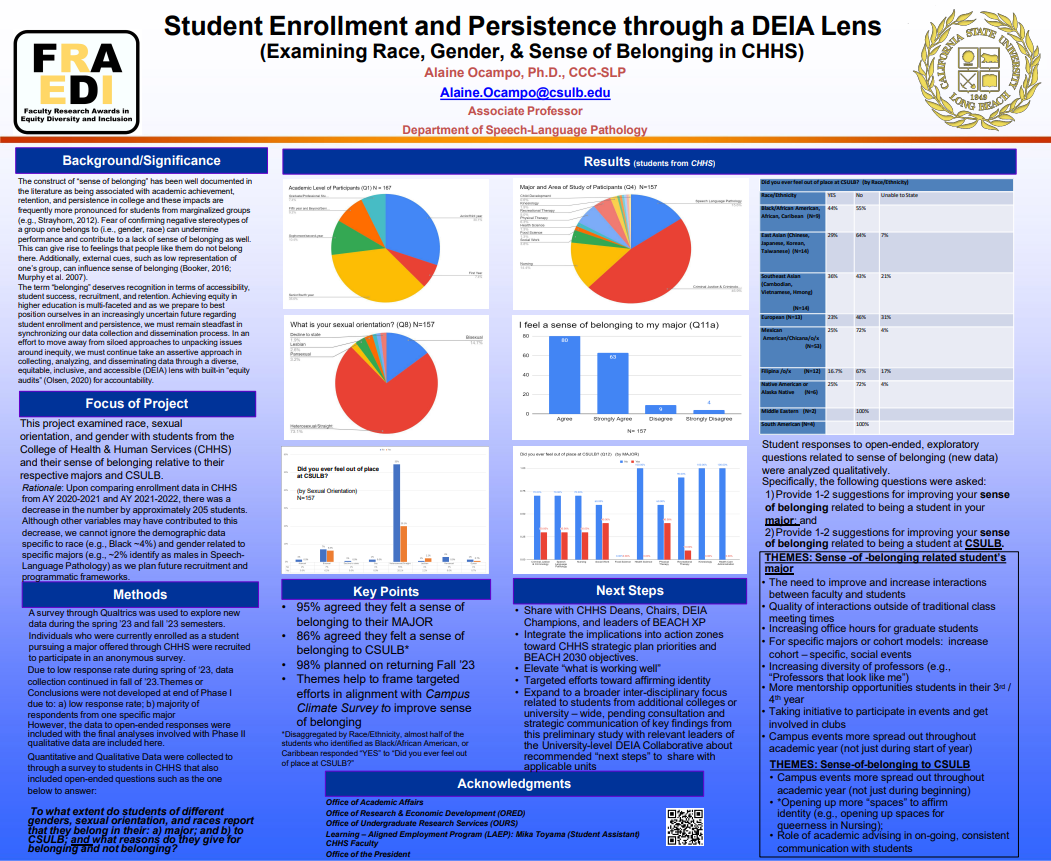
Faculty Member: Susan Nakaoka, Assistant Professor, Social Work
Project Title: Critical Race Pedagogy – Promising Practices to Recruit and Retain Students of Color
Project Theme #2 – EDI Campus Information
Abstract: During the fall of 2021, the School of Social Work adopted a critical race theory and critical pedagogy statement to guide their curriculum's focus on anti-racist social work praxis. Part of this vision includes a commitment to students who are underrepresented from Black, Southeast Asian and Pacific Islander populations. This project will develop critical race pedagogy by analyzing existing data on students who are underrepresented in the BSW and MSW program, interviewing current BSW and MSW students to determine their experiences and advice, and collaborating with two other CSU campuses to hold "summits" that will identify promising practices that address racial disparities in social work education. The co-applicants of this proposal are all Assistant Professors of Color who are committed to anti-racism in the school and across the CSULB campus.
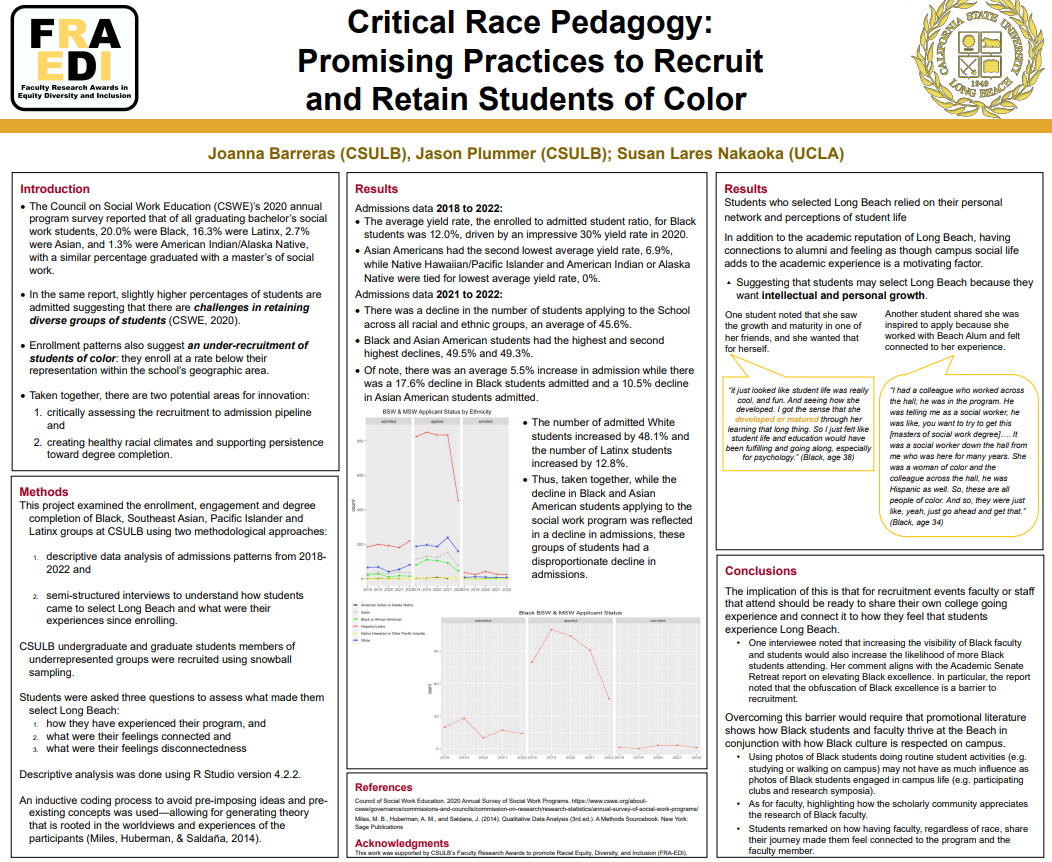
Faculty Member: Beth Manke, Professor, Human Development & LBCIP Program Director; Jake Wilson, Professor, Sociology & LBCIP Internship Course Instructor/ Coordinator
Project Title: Long Beach Community Internship Program: Promoting Diversity, Equity, and Inclusion
Project Theme #1 – EDI Campus Programming
Abstract: The Long Beach Community Internship Program (LBCIP) is a high impact internship program for CSULB students who graduated from Long Beach area high schools. The primary goal of LBCIP is to curate paid internships for students with local nonprofits, creating a bridge for low-income students of color back to their own communities to work and live. LBCIP aims to close the racial equity gap of paid internships and the loop of the Long Beach College Promise while ensuring students have opportunities to do meaningful work, hone professional skills, build high quality job networks, and explore local career options in local nonprofits. LBCIP intentionally partners with organizations that are not profit driven, many of which promote racial and social justice. In order to scale LBCIP, it is crucial that we gather data on students’ internship experiences so that we can develop additional program components that explicitly center anti-racism, equity, and social justice (i.e. community site trainings and workshops for students). For this project, we will utilize a multi-method evaluation of LBCIP where we gather information about racialized experiences and impact data from both students and community host partners. This will be the first effort on campus to evaluate internship programming through an EDI lens. Our research goals are as follows: (1) to better understand LBCIP student intern experiences especially those related to racism and classism; and (2) to better understand LBCIP site supervisors’ experiences mentoring and supervising student interns. Evaluation data will help LBCIP secure external funding while also improving LBCIP student internship experiences by developing anti-racism trainings for LBCIP site supervisors and EDI workshops for students.
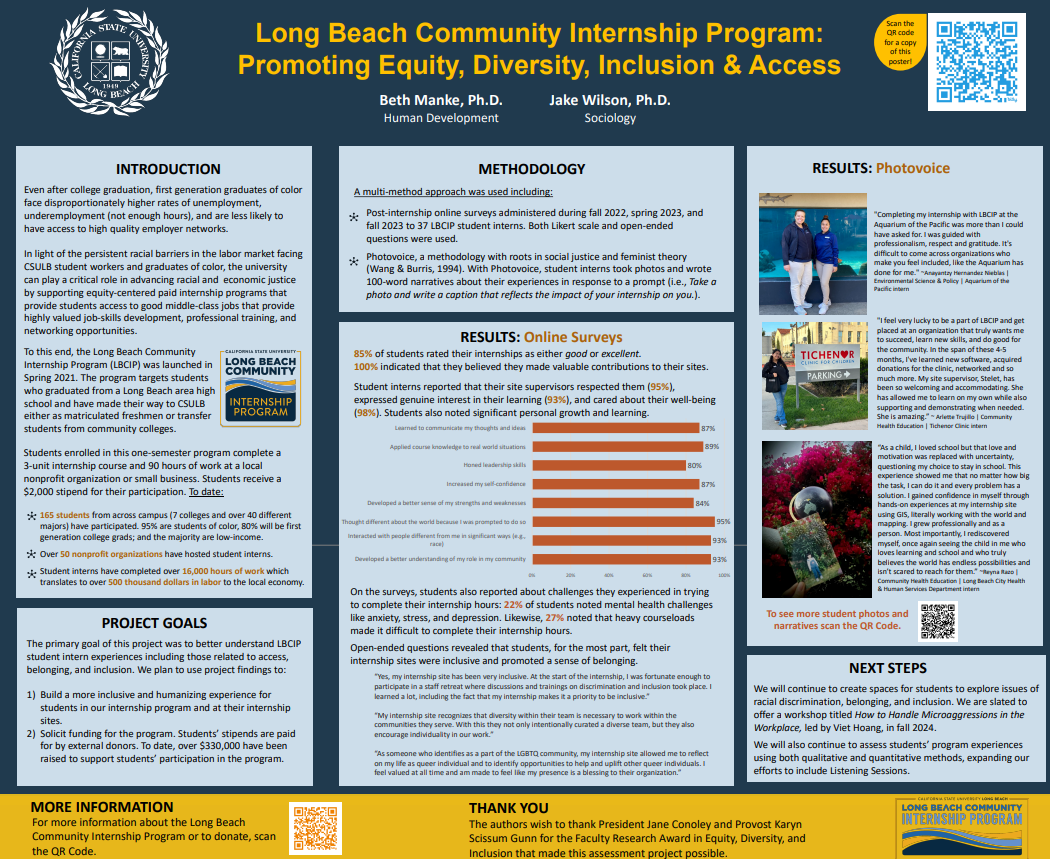
Faculty Member: Kimberly Kelly, Associate Professor, Human Development
Project Title: Equity, Diversity, and Inclusion in High-Impact Practices at The Beach: Student Experiences and Perceptions of Internships, Undergraduate Research, and Service Learning
Project Theme #2 – EDI Campus Information
Abstract: Approximately one in three CSULB undergraduates participates in an internship, research experience, or service-learning class during their time at The Beach. These High-Impact Practices (HIPs), among others, are widely considered essential experiences for undergraduate students that lead to greater academic achievement, learning outcomes, and personal and social development. However, most existing HIPs research is limited by its focus on HIPs at predominantly white institutions, often obscuring the experiences of historically marginalized students. To investigate whether all students have equal access to and equitable experiences in HIPs, research is urgently needed at Minority-Serving Institutions to amplify the experiences of students of color, as well as students who are first-generation and from lower-income backgrounds; in internships; research; and service learning. The current project uses a mixed-methods design to analyze institutional student demographic data and survey data on CSULB student experiences in internships, undergraduate research, and service learning. Quantitative analyses will test whether the degree of participation, quality of experiences, and perceived learning gains vary by race, first-generation status, and Pell eligibility. Qualitative analyses of open-ended survey responses will identify what, if any, barriers to HIPs participation and inequities in experiences exist for CSULB students. The results center the experiences of historically marginalized students in HIPs, unpack inequities in program implementation, and reveal barriers to participation. The findings can be used to develop empirically based and actionable recommendations to increase equity in HIPs implementation and access to HIPs programming at The Beach.
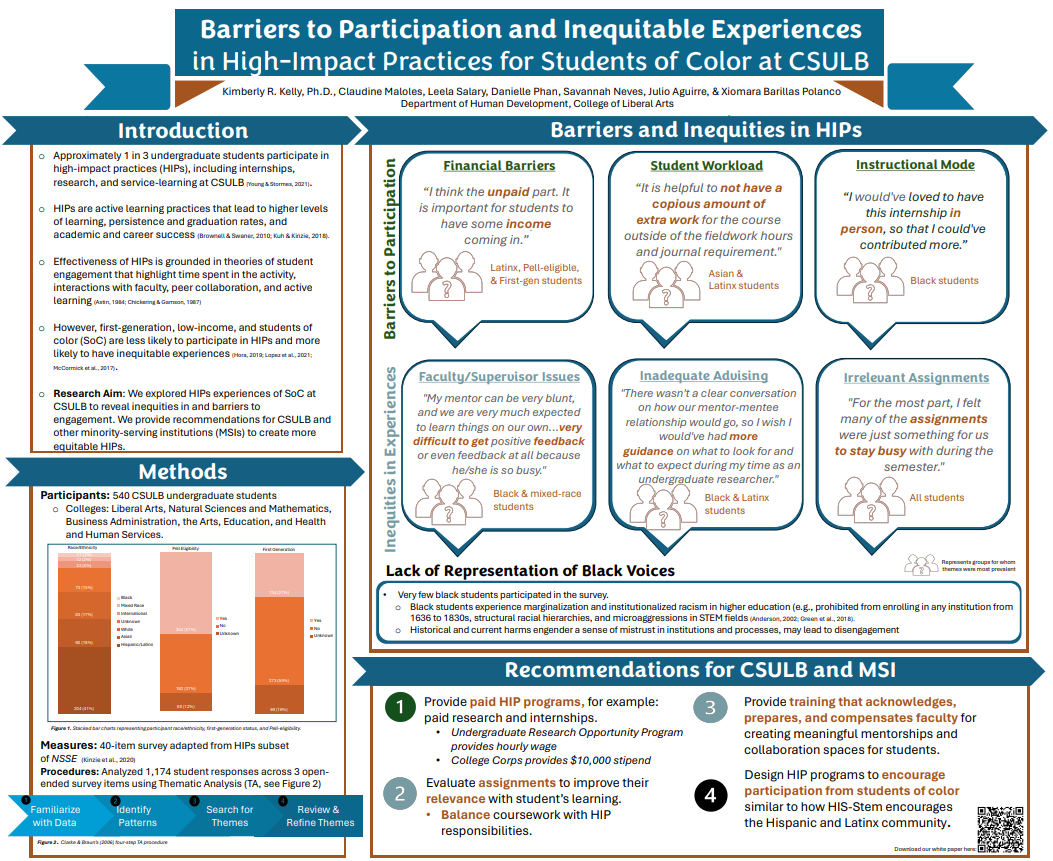
Faculty Member: Sara Moghtadernejad, Assistant Professor, Chemical Engineering II; Mehrdad Aliasgari, Associate Professor, Computer Engineering and Computer Science
Project Title: Closing Equity Gaps in Engineering Courses: Interventions and Best Practices for Culturally Responsive Teaching in Engineering
Project Theme #2 – EDI Campus Information
Abstract: There are persistent equity gaps in engineering courses indicate that students who are underrepresented receive disproportionately higher rates of D, F, or W grades (i.e., DFW rates). Moreover, there are GPA gaps between UR and non-UR students in Engineering courses. In this project, we aim to utilize existing campus data to identify such courses in the College of Engineering at CSULB. We will then identify culturally responsive practices of effective teaching in such topics. We will subsequently work with engineering departments and faculty who teach these topics on how to incorporate interventions and best practices for inclusive teaching. Our aim is to close the opportunity and equity gaps in the College of Engineering by identifying and eliminating any barriers in our course offerings.
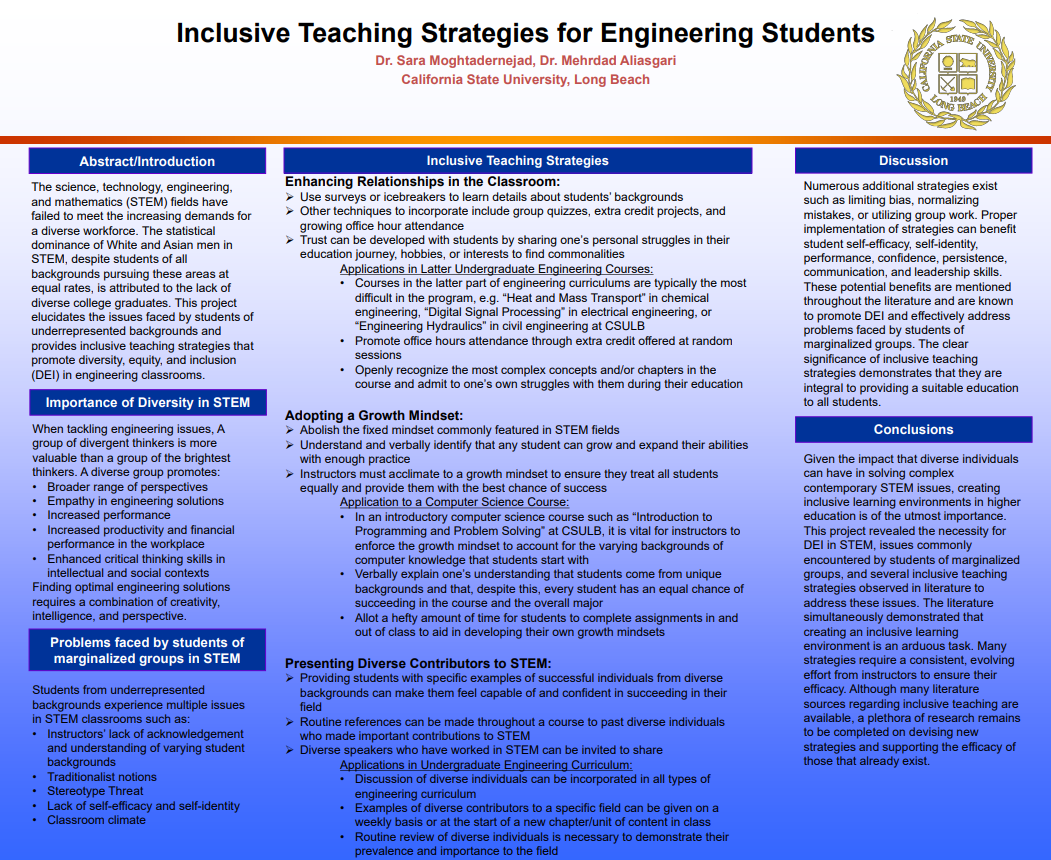
Faculty Member: Nicollette Brant; Michelle DeMars; Norah DeBellis; and Alexis Pavenick, Librarians
Project Title: Equity-Centered Learning: Information Literacy Canvas Modules for CSULB 1st Years and Transfer Students
Project Theme #1 – EDI Campus Programming
Abstract: University Librarians will develop highly scalable Canvas modules that teach information literacy, which includes techniques of resource access and research evaluation. The modules will provide an equitable introductory information pathway for CSULB students. Diverse student needs include 24/7 accessibility, and simple, straightforward explanations about information access, evaluation, and use. Our development will be aimed at incoming First-Year and Transfer students and focused on filling equity gaps in information literacy instruction, while also addressing digital equity.
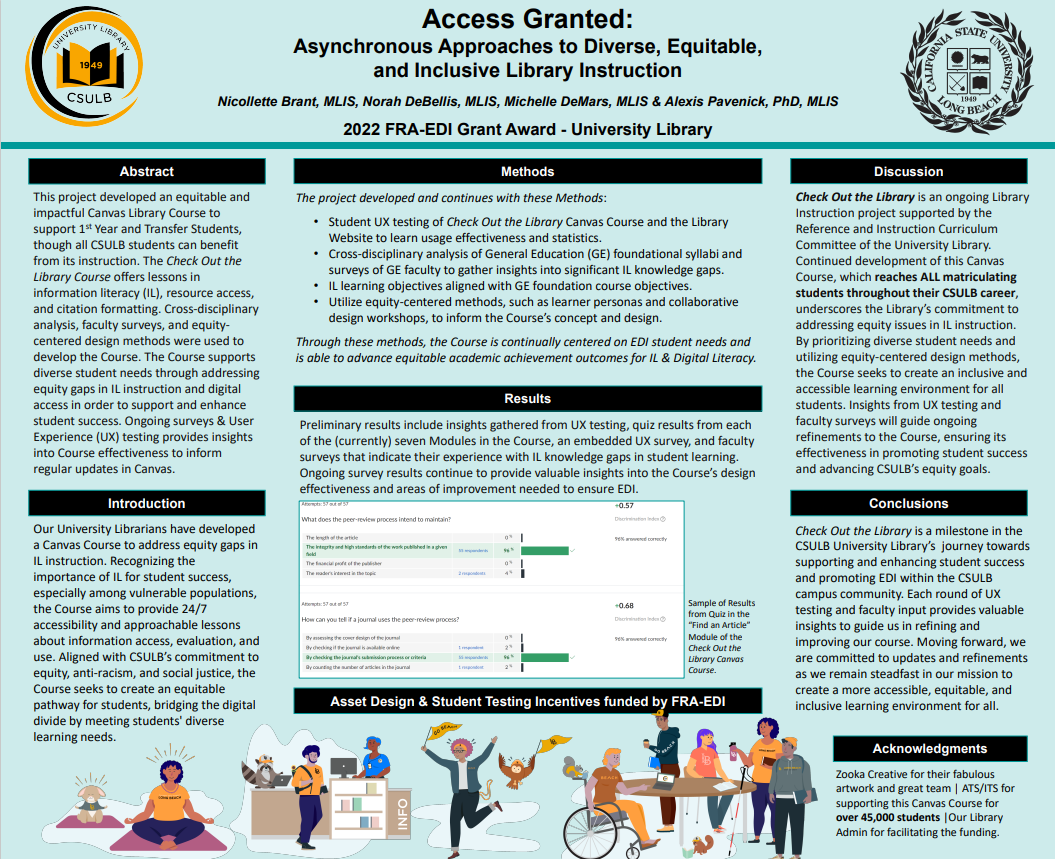
2021 - 2022 FRA - EDI Award Recipients
Faculty Member: Devery Rodgers, Assistant Professor, Educational Leadership
Project Title: Exploring the Black Graduate Student Experience in CED
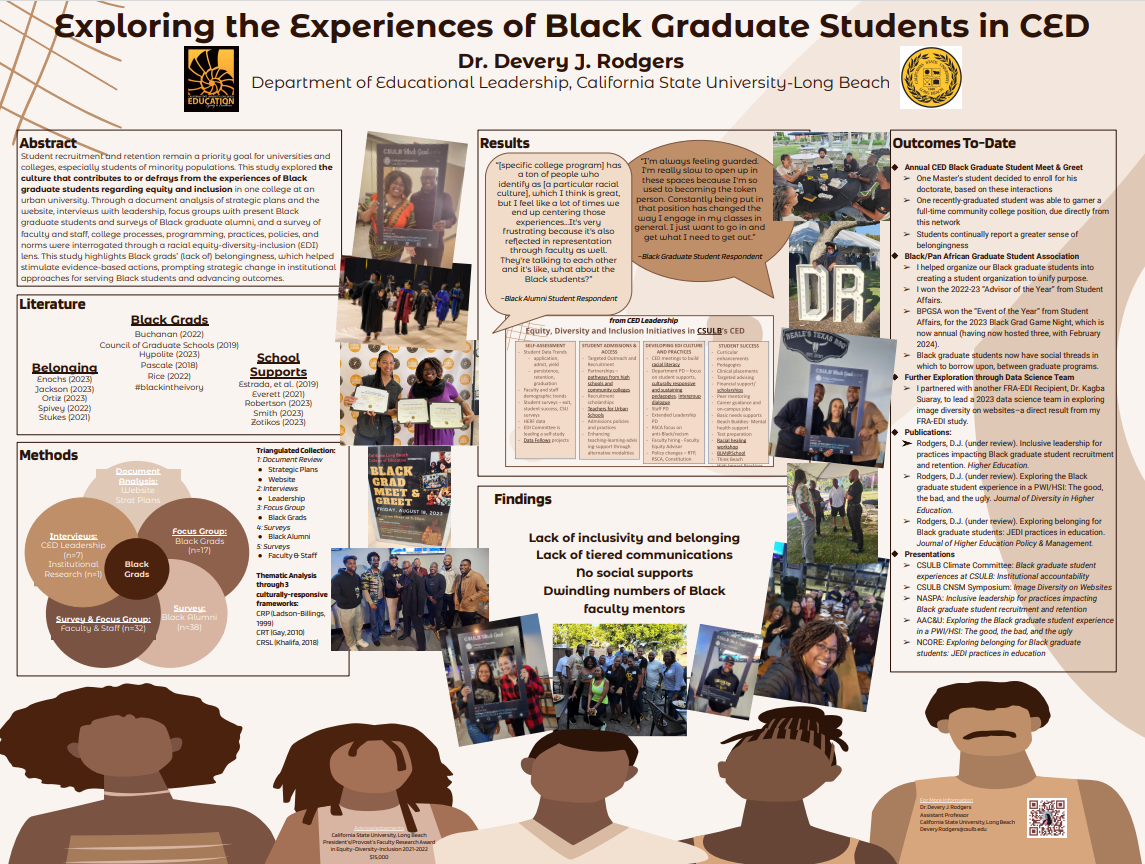
Faculty Member: Jeffrey Bentley, Associate Professor, Human Resource Management
Project Title: Supporting Black Small Business Owners Inside and Out: Evaluating and Developing Access to Financial, Human, and Identity Capital
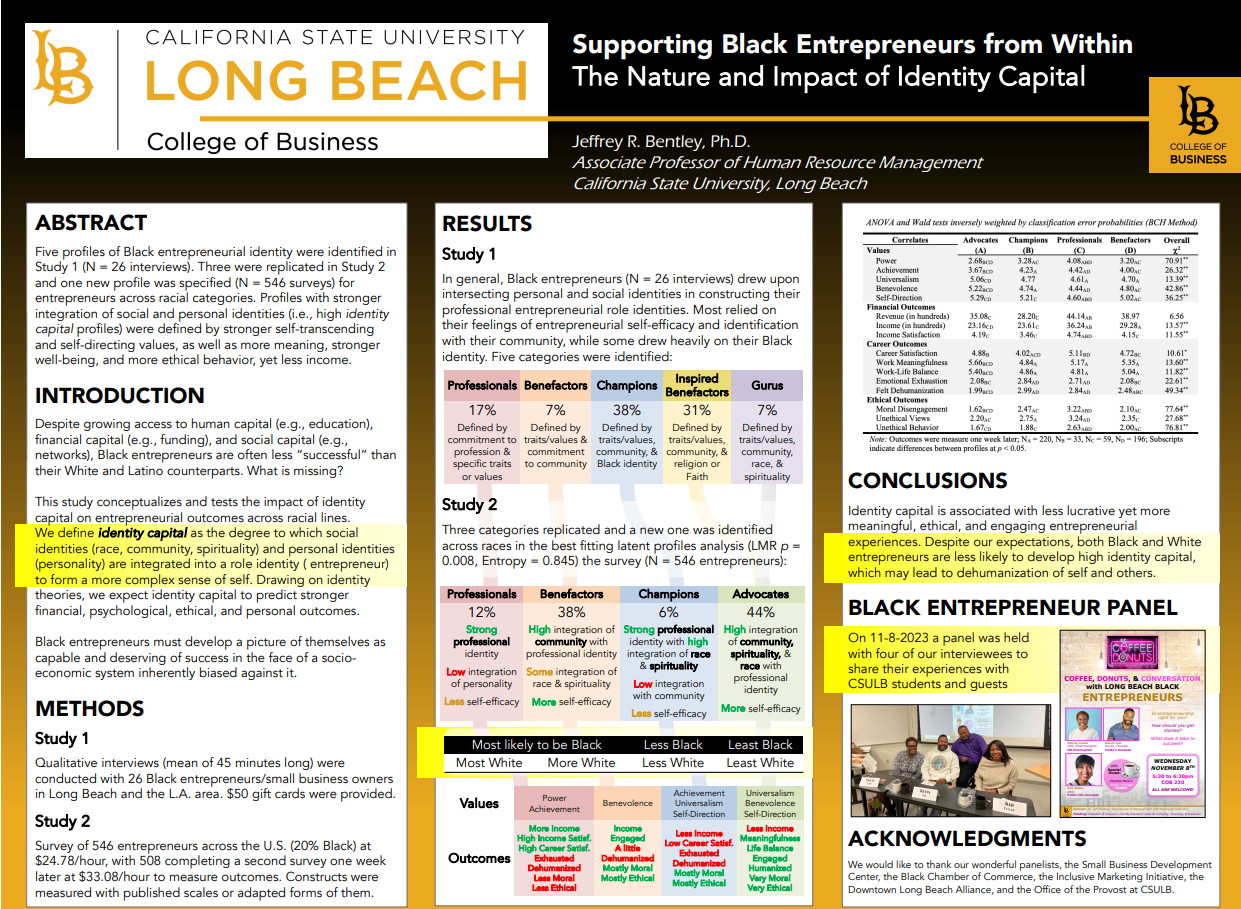
Faculty Members: Kagba Suaray, Professor, Mathematics and Statistics; and Xiyue Liao, Assistant Professor, Mathematics and Statistics
Project Title: The Long Beach Urban Data Science Collective
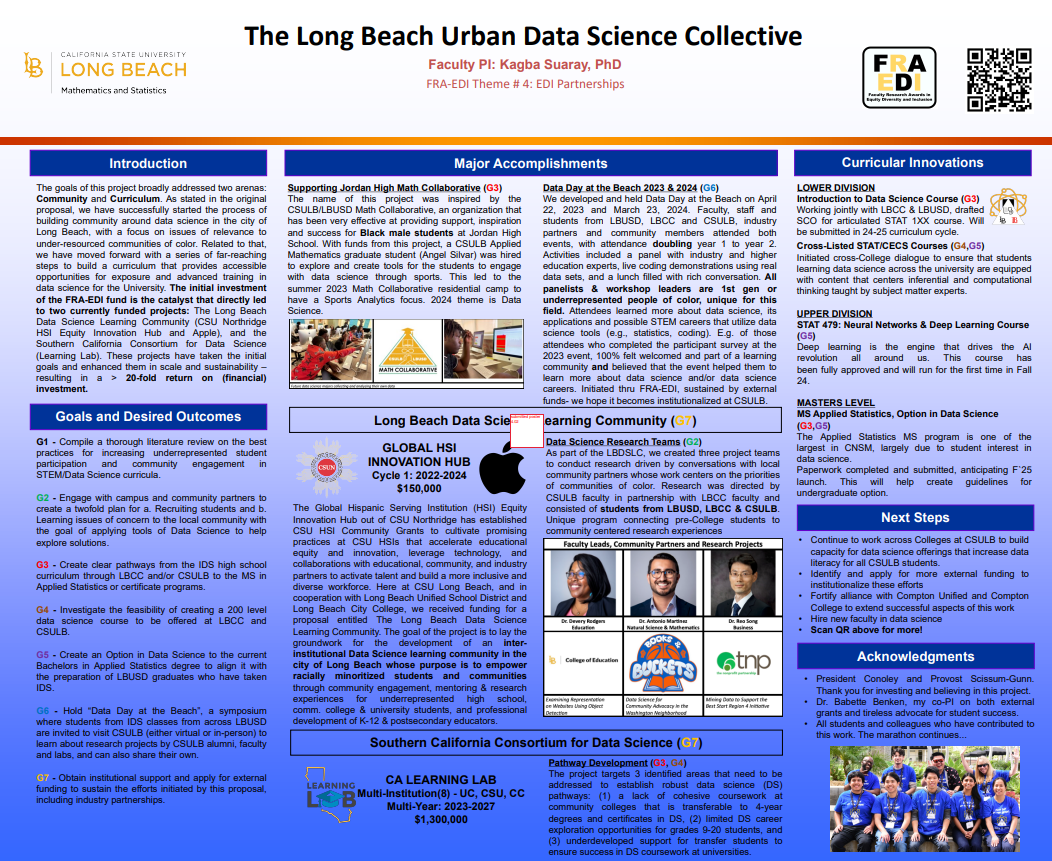
Faculty Members: Rebecca Bryant, Associate Professor, Dance; Brooke Winder, Assistant Professor, Dance; and Rebecca Lemme, Associate Professor, Dance
Project Title: Collective Embodied Social Justice Training
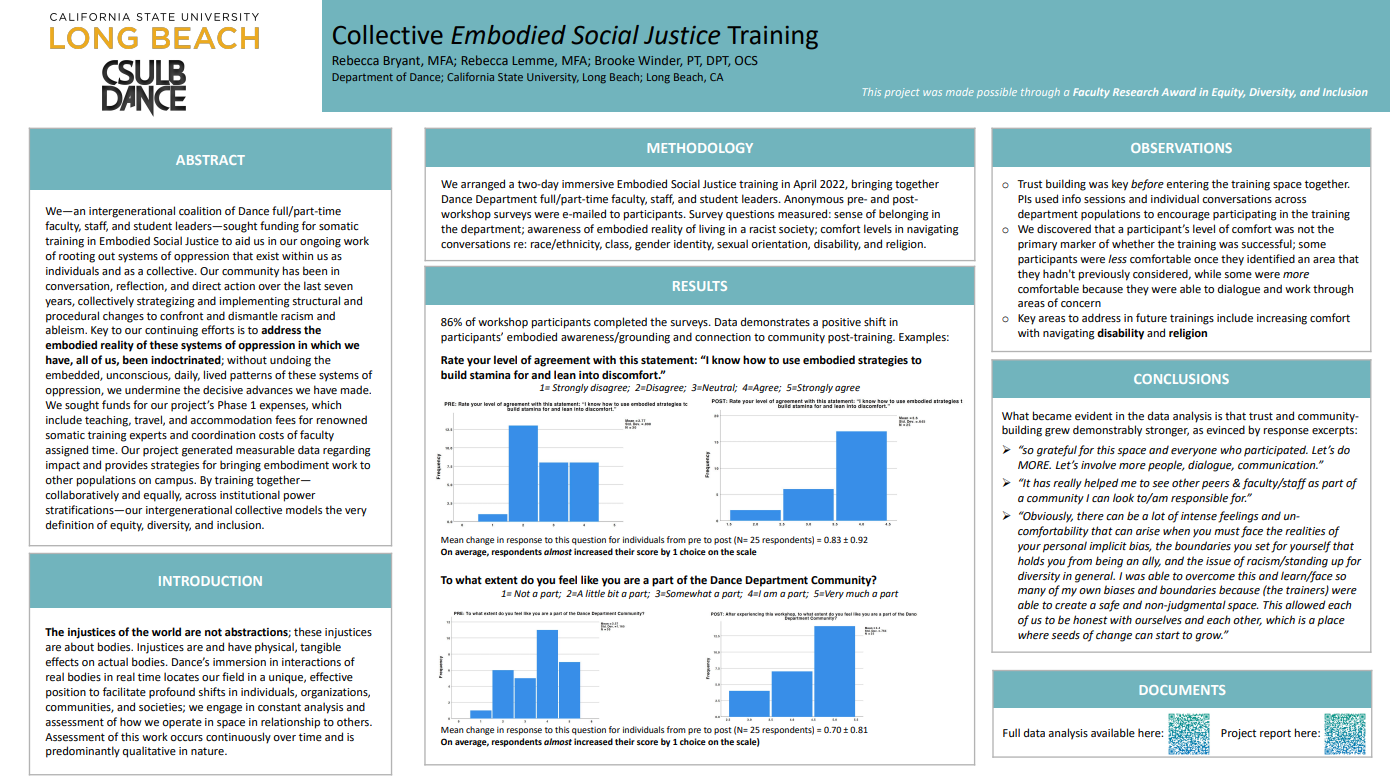
Faculty Member: Leilani Madrigal, Associate Professor, Kinesiology
Project Title: Examining recruitment and diversity, equity and inclusion training in student leadership positions on campus
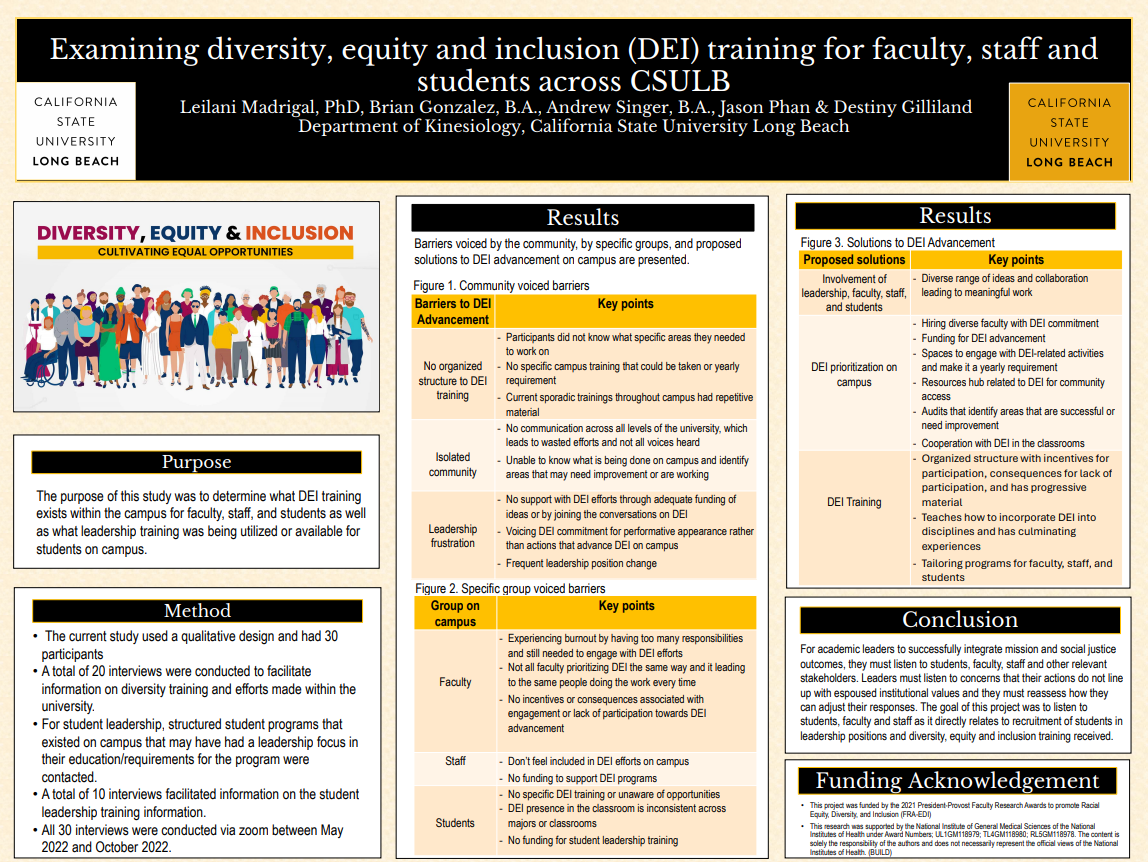
Faculty Members: Dina Perrone, Associate Professor, Criminal Justice; and Mischelle Van Brakle, Criminal Justice
Project Title: The Ebony Tower: Oral History Narratives of Black/African/African American Criminology/Criminal Justice Students at CSULB
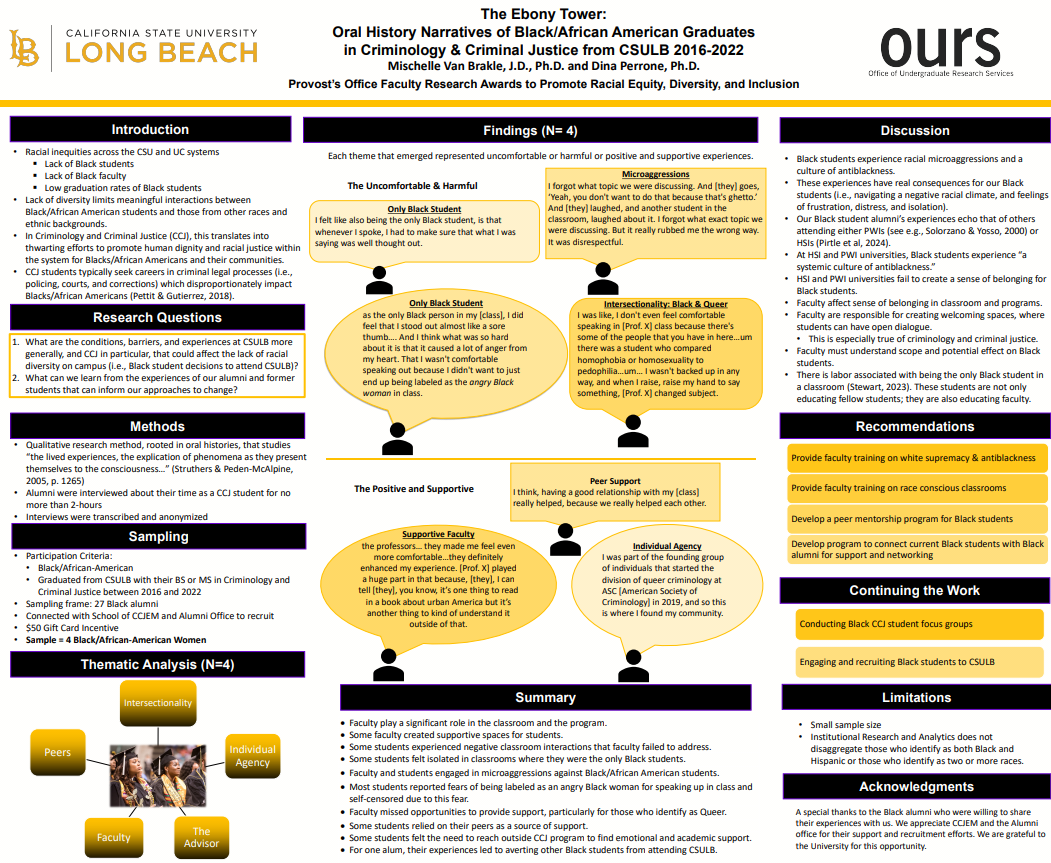
Faculty Member: Dede Long, Assistant Professor, Economics
Project Title: The effect of second-order belief: how better information reduces gender and racial gaps in educational outcomes.
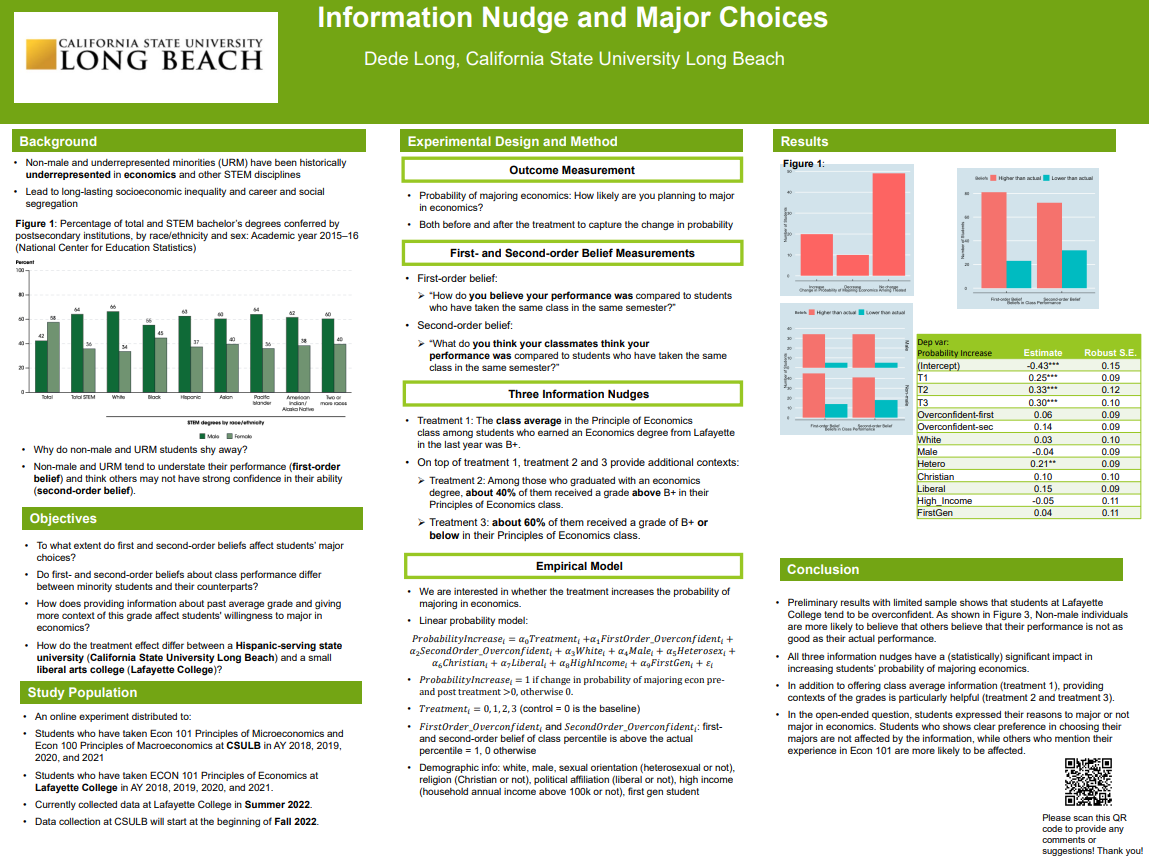
Faculty Member: Ann Kim, Assistant Professor, Human Development
Project Title: Promising Pathways to CSU Long Beach: Program Evaluation of the Juan Rodriguez Cabrillo High School Academy of Global Logistics (AGL) Pathways Program
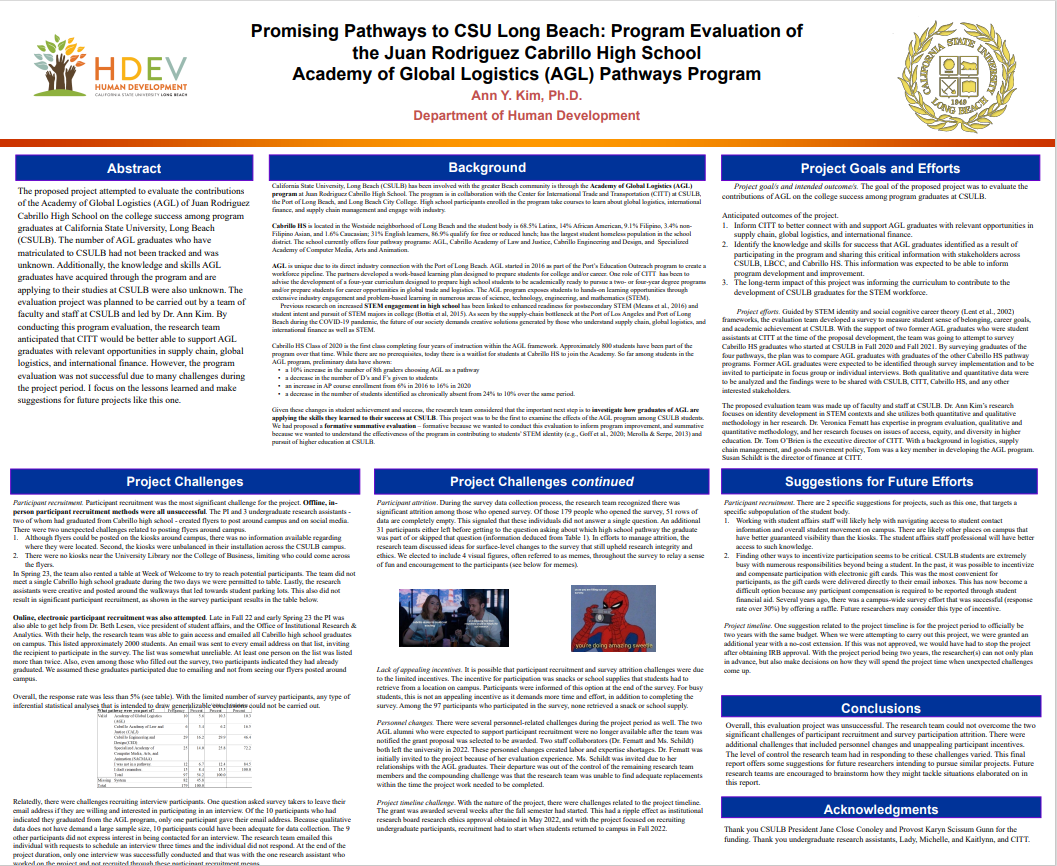
Faculty Member: Yu-Fu (Paul) Ko, Associate Professor, CECEM Department
Project Title: Equity, Diversity, Inclusion, Anti-Racist, and Social Justice in Civil Engineering Program
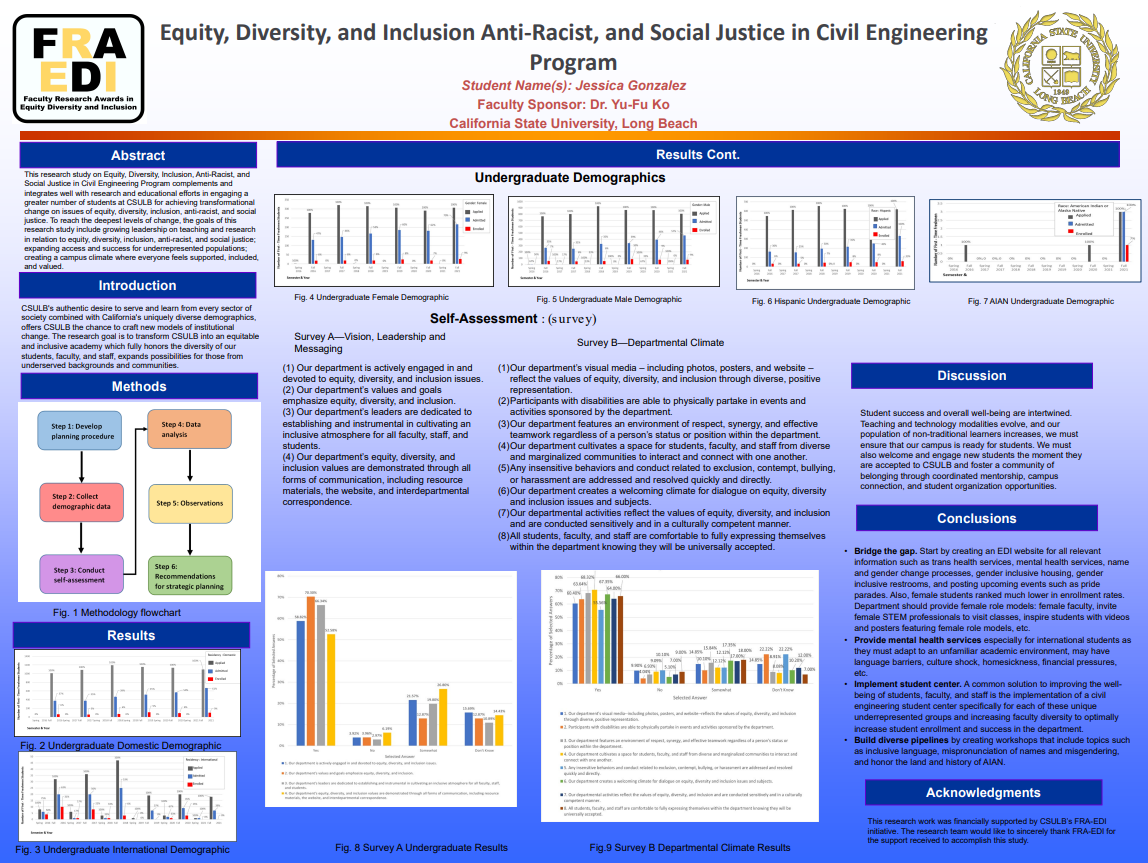
Faculty Members:
Tracy Gilmore (Senior Assistant Librarian)
Nicollette Brant (Senior Assistant Librarian)
Michelle DeMars (Senior Assistant Librarian)
Kelly Janousek (Librarian-Tenured Faculty)
Alexis Pavenick (Senior Assistant Librarian)
Project Title: Assessing University Library Collections for Equity, Diversity and Inclusion
